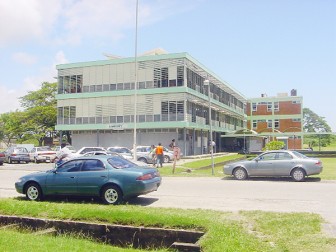Ahead of a critical meeting to discuss financing for the University of Guyana (UG), Pro-Chancellor Dr Prem Misir has described the institution’s strategic plan as “archaic” and says that any additional government funding must require a cost-review for various aspects of the university’s operations.
UG’s proposed strategic plan 2009-2012 was approved by the University Council in 2009, but there have been reports that senior University officials, including the university’s Vice- Chancellor Professor Lawrence Carrington, are distressed about the university’s finances and the lack of government support for the institution.
Efforts to contact Carrington yesterday were unsuccessful, but a source familiar with the issue said that it is strange that Misir would criticise the plan when he would have been one of the persons who helped to get it approved.

Misir, in a letter in published in yesterday’s edition of the Stabroek News, said that due to the fiscal crisis in relation to universities which have caused them to receive decreased funding, some dramatic reorganisation adjustments are necessary. He pointed to developments in Britain and the US, where the governments have proposed cutbacks in their budgets for universities.
“I want to say, too, that the University of Guyana is not sacrosanct in the face of decreased funding, and the urgent need for cost reviews and general reorganisation in relation to staffing, the curriculum review variable and its correlation with national development needs, quality assurance, and rethinking of school/departmental social infrastructure,” Misir said in his letter.
 “The University’s strategic plan is archaic and fails to address significant issues that demand proactive responses; it requires essential strategies and the adoption of current innovative international best practices in higher education,” he continued. “There is hardly a trace of web-based student interaction and online education support. And the Berbice Campus needs some serious autonomy with an academic faceover in light of Turkeyen’s perennial, silly stranglehold on its innovative academic potential,” he added.
“The University’s strategic plan is archaic and fails to address significant issues that demand proactive responses; it requires essential strategies and the adoption of current innovative international best practices in higher education,” he continued. “There is hardly a trace of web-based student interaction and online education support. And the Berbice Campus needs some serious autonomy with an academic faceover in light of Turkeyen’s perennial, silly stranglehold on its innovative academic potential,” he added.
The source told this newspaper that it appeared that there is some secret plan being unveiled, while noting that recently Education Minister Shaik Baksh had made similar remarks. In March of this year, Baksh had called for a review of the UG strategic plan, which he said should be tied to any increased funding for the institution.
“It shows clearly that there is some agenda that has been unarticulated clearly at work,” the source told this newspaper. According to the source, these were not messages addressed cordially between the government and the university.
The source said the issues raised by Misir in his letter could be an attempt to preempt a meeting that is scheduled for tomorrow. Misir is expected to chair a meeting of the Finance and General Purpose Committee, which is a sub-committee of UG’s Council. This committee makes recommendations to UG’s General Council on matters relating to financing. Stabroek News understands that the matter of increased subventions and student fees are supposed to be addressed at tomorrow’s meeting ahead of the Council meeting, which is slated for August 17. According to the source, the statements in Misir’s letter most likely means that the University will not be benefiting from increased government subventions or higher student fees.
“Any additional funding from the Government of Guyana must as a precondition require a cost review in relation to the curriculum-national needs variable, full and part-time faculty, and registered students,” Misir said in his letter. “The current management dispensation for reforms at this University is not working because the University needs a revolutionary transformation, not reforms. The University needs innovators.”
Frankly
Earlier this year, Stabroek News had publicised a report in which Carrington frankly assessed the problems at UG. “This circumstance is particularly distressing because when I assumed my appointment as Vice-Chancellor, indications were (at levels of the government to which I had access) that the government would seek to increase its support once the university had an approved strategic plan and had taken steps to deal with quality assurance issues,” he said in the report. He also argued that Guyana cannot afford to continue neglecting the needs of its university.
Following the publicising of the report, Baksh, during a press briefing, said that the government was committed to improving the university, but noted that Cabinet had raised concerns about certain aspects of the plan. He said that 19 concerns were cited and pointed out to the administration at UG but that there had been no amendments. He said that government gave the green light for the university to proceed with the implementation of certain aspects of the plan, which did not require the expenditure of financial resources, such as increasing managerial and operational efficiencies.
Baksh said when Carrington was recruited to head the university, government made the terms of reference clear; he would identify internal constraints to the implementation of the strategic plan (capacity, managerial and systematic weakness), examine proposals to be put up by the campus to achieve efficiency gains in its overall operations and implement strong measures to improve quality assurance.
Of the concerns raised, it was recommended that UG should consider means by which the majority of social science registration can lead to increases in science and technology. Secondly, it was pointed out that the Turkeyen campus should consider a radical shift towards the distance mode and Information Technology delivery as a primary rather than a supporting mode of delivery of tertiary education. Baksh also said that another recommendation was UG should begin to plan for the long-term future of the campus and nation, which should be significantly different from what obtains at present.
The minister also said that the government has been increasing its contribution to the university, noting that the institution received $1.1B in 2010 and this year it received $1.218B, an eight percent increase. Additionally, he noted that the university’s subvention has been bumped up from $686M in 2010 to $707M in 2011.
Meanwhile, regarding the implementation of the Strategic Plan, the source indicated that the university administration is trying to implement the less financially demanding aspects of the document. The source explained that a loan from the World Bank is being used to develop one aspect of the university’s infrastructure while another loan from the Caribbean Development Bank (CDB) is helping with the restructuring of aspects of the organisational structure.




